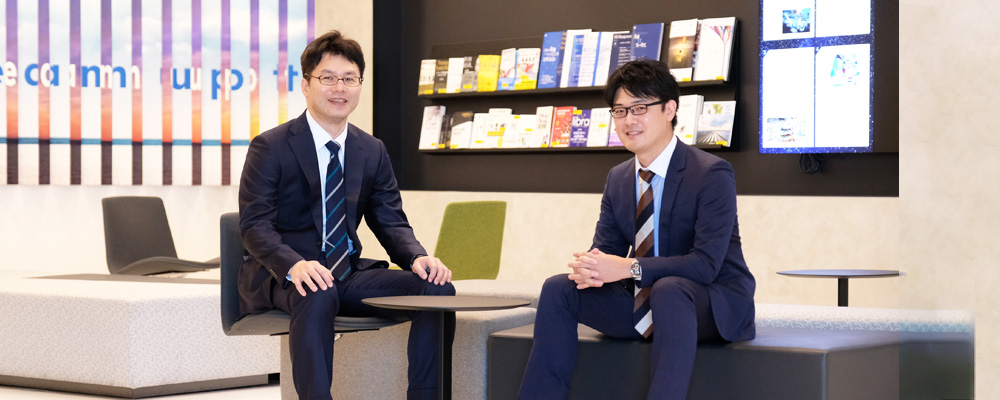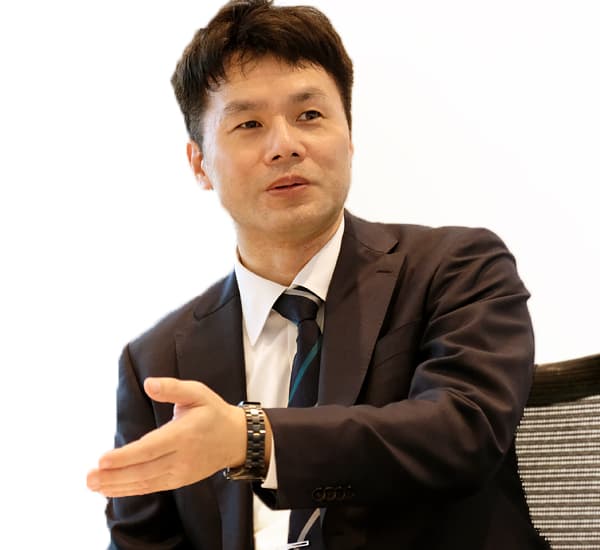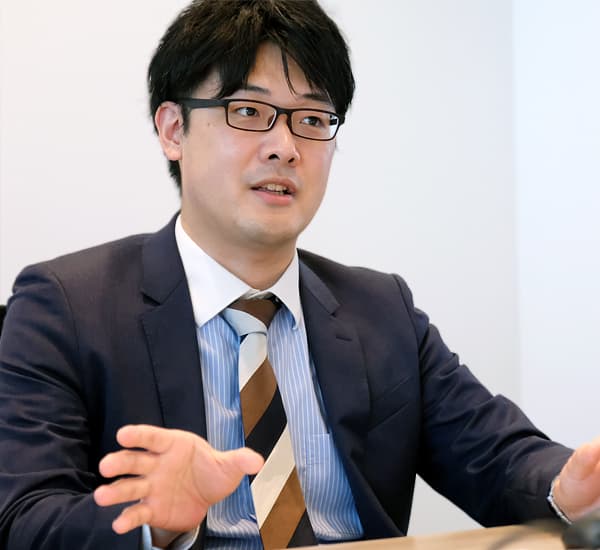
To What Extent Can Quantum Computers Change Business? -- Optimizing the Future
Quantum computers can perform the kinds of complex calculations that conventional computers cannot easily accomplish. NRI believes that by using this technology to make optimization calculations, and moreover using it in combination with predictive calculations employing machine learning, will make it possible to optimize business value as well. We sat down with NRI members Shinichiro Ohno and Eiji Fujiyoshi, who are involved in quantum computer research, and asked for their input on the subject.
Quantum computers are gaining attention in the field of optimization
--- Tell us about your backgrounds and how you came to be involved in the field of quantum computers.

Fujiyoshi: I’ve written for the publication “IT Roadmap” (published by Toyo Keizai) and taken part more broadly in NRI’s IT navigation activities, and through all this I’ve been surveying cutting-edge technologies that will change how our customers do business. In 2015, Google gained notice when it presented a paper on how it had used a quantum computer developed by Canadian venture firm D-Wave Systems, and how this machine was 100 million times faster than a conventional computer under certain conditions. When I saw this news, I thought something amazing would come of it, so that was a major reason behind why I got involved in studying quantum computers.
Ohno: I’m in charge of business applications and technical support for machine learning technology, which is one field within AI. If you use machine learning to analyze a customer’s data such as their sales history, for example, you can predict which of their clients to visit are likely to produce sales for them the following month. In recent years, we’ve been approached by customers who say things like, “If we could predict the clients we should visit next month, we could probably use those predictions to optimize our travel routes or sales rep shifts, and even increase our efficiency.” I believed that if we combined machine learning with optimization calculations using quantum computers, we could probably solve our customers’ problems, and so I began my survey of quantum computers which were gaining attention in the area of mathematical optimization (specialized for optimization calculations, known as “annealing-based”).
Bringing solutions to problems that conventional computers cannot solve
--- What kinds of problems in society or in companies can quantum computers be expected to solve?
Ohno: Using machine learning, we can predict next month’s sales for a retail store, or predict next month’s freight flow for a logistics company. But you can’t change conditions on the ground just by making predictions for next month. More specifically, you need to apply those predictions to your concrete operations, namely by deciding what quantities of your products to place in specific stores, how many delivery agents to arrange for, and which routes to use for making deliveries next month. That’s where simulations using optimization technology can be of use, for the purpose of exploring and discovering operations that satisfy the requirements which need to be fulfilled for your business (quality, cost, deadlines) while also enhancing your efficiency.

In this sense, optimization technology is for enhancing the value of predictions made using machine learning, and it’s arguably essential for on-site reforms. But when you actually try to optimize your operations, you need to take a great variety of factors into account. Because there are so many variables handled in the calculations, it’ll be extremely difficult to do them using conventional computers.
Using quantum computers makes it possible to solve problems that involve a huge number of variables and that would be impossible to solve with traditional computers. The applicable problems aren’t limited to logistics. I think this technology has the potential to bring about changes in many industries, when it comes to things like optimizing production lines, optimizing portfolio calculations in finance, developing new pharmaceuticals, calculating routes to eliminate traffic congestion, and more.
Useful for calculating optimum trash collection routes, ideal taxi allocation as well
--- In what kinds of fields or businesses can efforts to address optimization problems be utilized?
Ohno: For example, Mitsubishi Estate is working on an initiative with support from Groovenauts, an AI venture firm based in Fukuoka City, which involves using machine learning to predict the amount of trash produced in the Marunouchi area, and using quantum computers to find the optimal travel routes for trash collection vehicles. I think the combination of two calculations, namely prediction and optimization, has also become well suited in recent years to the domain of MaaS (Mobility as a Service), which has been gaining notice. In a case where multiple events are being held near each other, it’s possible to predict roughly how many participants will be gathered at specific events, calculate the approximate times at which taxis will be needed at certain locations, and then predict the order for dispatching vehicles that will be the most lucrative.
Fujiyoshi: Still, what’s important to note here is that the use of quantum computers in business isn’t really so straightforward. Quantum computers come in two formats, broadly speaking, these being gate-based *1 and annealing-based *2 , both of which are still becoming more technically advanced. The annealing-based version has already been commercialized by D-Wave Systems, and efforts are also underway in Japan to create annealing-based models using conventional computers. Optimization calculation research involving companies is quite active, but the actual machines don’t yet have enough computing capability to solve problems with huge numbers of variables, and in some case optimized calculation results can’t be obtained. Meanwhile, when it comes to gate-based machines, efforts by Google and IBM and such are creating social buzz, you have to look between 5 and 10 years ahead to see when these machines will be ready for use in business.
Companies looking to solve the world’s challenges and NRI working together
--- What kind of support can NRI provide when it comes to using quantum computing?
Fujiyoshi: As I described earlier, quantum computers aren’t something that can be used for business immediately. It’ll be important to take a long-term perspective beyond immediate profits, and consider how your company can responsively alter how it does business in the era when quantum computers really arrive in earnest. NRI can assist in considering what kinds of applications can contribute to our customers’ business, by providing information about the current state of quantum computers and relevant issues, as well as the prospects going forward.
Ohno: In order to make optimization using machine learning or quantum computers applicable to your business, you need three things: discussing the topics to which it’ll be applied, putting infrastructure in place for data utilization, and having expert capabilities for mastering machine learning or optimization technology.
At NRI, our consultants, infrastructure engineers, and data scientists form a trinity that can provide support. My hope is that with this collective capability, we can produce as many use cases as possible for making the world a better place.
Currently, an organization to which NRI also belongs, called the MCPC Quantum Computer Promotion WG, is exploring use cases where manufacturers that provide quantum computers and technologies derived from them are collaborating with users who handle the industrial application of these technologies to solve societal problems, and the group is also moving forward with a related PoC (proof-of-concept). I hope that through these kinds of community activities as well, we can contribute to the societal application of cutting-edge technologies.
-
*1:
Gate-based machines involve the creation of calculation circuits used for solving problems, based on how elements in a quantum state behave or are combined. A variety of approaches have been proposed to make this a reality, such as superconducting, ion-trap, and topological quantum computing. There are high expectations that these will be backwards-compatible with conventional computers, and large IT vendors like Google and IBM as well as startups such as Rigetti Computing and IonQ are currently engaged in hardware development.
-
*2:
Annealing-based machines find solutions to problems by applying a technique inspired by “annealing”, a process by which the structural quality of metals is stabilized by heating and then slowly cooling them. The hardware created by D-Wave Systems, the company leading the way in commercializing this technology, establishes how elements arranged in a lattice will interact, and then applies a signal known as a transverse field to find a state in which the total energy of all the elements will be at its lowest. In Japan, NEC has announced that it is working towards the practical application of this technology by 2023 (NEC press release: “NEC Working on Ways to Significantly Improve Combinatorial Optimization Functions of Quantum Annealing, Accelerating Efforts for Practical Application” (January 23, 2018)).
Profile
-
Shinichiro OhnoPortraits of Shinichiro Ohno
Platform Services Development Planning Department Ⅰ
Shinichiro Ohno joined Nomura Research Institute in 2008. Since joining the company, he has been involved in system development for the finance and insurance sector as an architect and DB engineer. Due to his experience in corporate data utilization, he has been in charge of projects involving the use of machine learning (such as AutoML) and optimization technology (such as quantum computing) for various industries such as finance, insurance, logistics, and manufacturing.
-Member of MCPC Quantum Computer Promotion WG
-DataRobot Certified Data Scientist (best in Japan)
-DataRobot MVP of the year 2019 -
Eiji Fujiyoshi
* Organization names and job titles may differ from the current version.